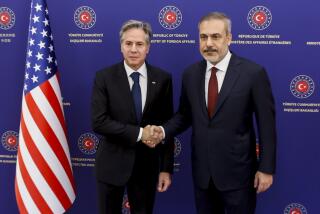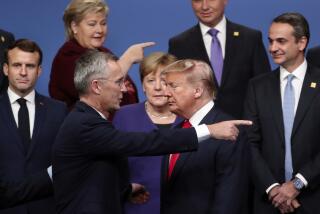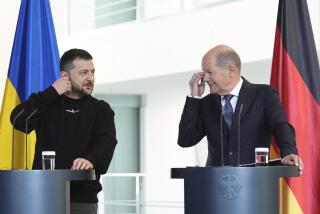Europe tour shows Obama feeling more comfortable at the top
President Obama played a game of doubles table tennis alongside British Prime Minister David Cameron in London the other day, in a display of awkward athleticism that ended when it was apparent they couldn’t beat their opponents — a pair of middle-school boys.
Yet they let the unguarded moment play out on television, an unrehearsed pas de deux the likes of which never took place on camera during Obama’s first presidential tour of Europe, a voyage marked by its careful orchestration.
But that was Obama’s first turn on the world stage, and a lot has changed since his introductory tour with heads of state in April 2009. Obama has slowly expanded his official and personal relationships with other leaders, and last week’s visit came in the aftermath of a U.S. raid in Pakistan that killed Osama bin Laden.
“He’s not the junior person anymore,” said Stephen Flanagan, a Europe specialist and senior vice president of the Center for Strategic and International Studies. “He has gained a lot of credibility for things he has done and for his general message about how he wants to engage with the rest of the world.”
Obama’s speech May 19 pressuring Israelis to return to the negotiating table with Palestinians appears to have given him more heft even in the last week, Flanagan said, as shown by the willingness of European leaders to hold off expressing support for the Palestinians’ intention of asking for United Nations’ recognition of a Palestinian state.
Yet when he arrived back in Washington on Saturday, Obama returned to the reality that, regardless of his popularity in Europe, his domestic audience is a fickle one. Americans expect their president to be a force on the world stage, but a strong standing there won’t guarantee his reelection.
“He received a particularly warm welcome in London despite a track record which has been viewed as anti-British by the U.K. press and some politicians,” said Nile Gardiner, a former advisor to Margaret Thatcher and a scholar at the conservative Heritage Foundation.
“However, I think his tour will have limited impact domestically,” Gardiner said, because voters will focus on the economy and “overseas tours will not benefit him there.”
With the U.S. budget deficit growing and unemployment hovering at 9%, Obama will probably return to focusing on domestic issues such as jobs. The president will travel this week to a Chrysler plant in Toledo, Ohio, where he is expected to tout the company’s repayment — six years early — of $7.6 billion in loans from the U.S. and Canadian governments made two years ago. The loans drew heavy criticism at the time from Republicans.
Still, the European trip took on added importance against the backdrop of pro-democracy rebellions sweeping the Arab world. As Obama met with other Group of 8 leaders in Deauville, France, he did not underestimate the potential global impact of the fledgling revolutions. And although pledges of financial support to the governments of Tunisia and Egypt were met with skepticism from observers who said past G-8 promises of aid to African nations failed to materialize, the administration viewed the commitments as an affirmation of the international resolve to support democratic movements.
Advisors who were in the room for Obama’s one-on-one talks during his six-day trip described conversations that suggest his relationships with European allies have deepened.
Obama’s conversations with Russian President Dmitry Medvedev stood out in particular, as candid photos from inside showed the men laughing with each other. One aide said the two men were joking about mutual acquaintances, though they wouldn’t say which world leader, if any, was being discussed.
Yet neither man felt the need to paste on a smile as they emerged for statements to the media, adopting grim visages and a stiffness that made some observers wonder what had gone wrong. It was hot in the room, a close advisor said, and the two had wrestled over the missile defense system that the U.S. wants to build in Europe but which worries the Russians.
One White House official characterized the disagreement as a sign of the maturity of the relationship between the two men.
“The reason that they can talk about the issues they’re talking about now is because of the amount of time they’ve invested in that personal relationship,” said Ben Rhodes, deputy national security advisor to the president. “It was only because of the rapport they built up with each other in negotiating the [New] START treaty and working through a range of issues in 2009.”
There were other signs of Obama’s growing comfort.
He lingered over a Guinness beer at a pub in Ireland, and laughed off a bit of confusion when he was in the middle of a toast to the queen of England and the band began to play, sounding like an orchestra nudging a long-winded Oscar winner off the stage.
He greeted a few leaders with slaps on the back. He went into a news conference without a card to help him with reporters’ names. In one G-8 session, he was seen chewing gum.
It’s hard to tell what Obama’s growing ease on the world stage means for U.S. interests. He and Medvedev may never achieve an agreement on the missile defense issue before one or both leave office.
If the vision Obama tried to promote for supporting democracy in the Middle East and North Africa comes to pass, it will be years in the making and won’t necessarily be traced back to the G-8 meetings in Deauville.
But the Russian and American teams now have more than 20 working groups that could eventually bear fruit, if only because the two countries continue to talk. This week, for example, Medvedev decided to help the international community in its talks with Libya, where Russia still has contacts. And Medvedev said for the first time that Libyan dictator Moammar Kadafi must leave power, an added weight on the embattled regime.
An open line of communication with Russia also could ease security concerns in Poland, the final stop on Obama’s tour this week.
After Polish Prime Minister Donald Tusk had his one-on-one meeting with the president, he told Obama, “You are proverbial.”
With that kind of feedback, it’s not surprising Obama had a bounce in his step last week.
Even in his overmatched ping-pong partnership with Cameron, Obama laughed and teased the British prime minister, who was elected last year and is a relative newcomer to the diplomatic game.
When Cameron finally got off a shot with a little spin on it, Obama reached out and gave him a high-five.
“That’s what I’m talking about,” he said.
More to Read
Start your day right
Sign up for Essential California for news, features and recommendations from the L.A. Times and beyond in your inbox six days a week.
You may occasionally receive promotional content from the Los Angeles Times.







